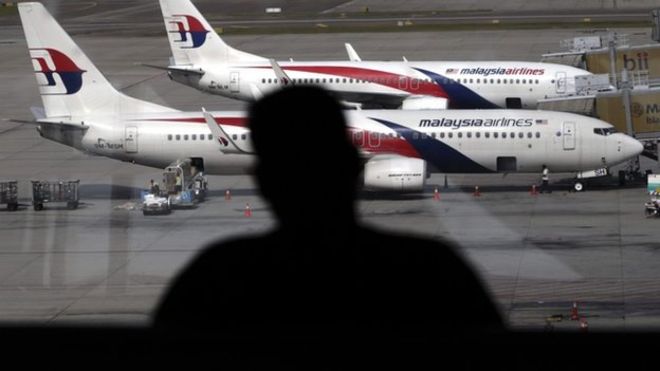Malaysia Airlines is “technically bankrupt”, its chief executive has said, as he announced a restructuring programme and plans to cut about 6,000 jobs.
The announcement follows the twin air disasters which forced its nationalisation last year.
The airline said it had “offered jobs” to 14,000 of its 20,000 workforce.
The move was expected and follows the appointment of new chief executive Christoph Mueller in May.
“We are technically bankrupt,” Mr Mueller told a news conference. “The decline of performance started long before the tragic events of 2014.”
The airline is operating as normal and no flights are currently affected.
In March last year, Malaysia Airlines flight MH370 disappeared with 239 passengers and crew aboard. The plane is still missing.
Four months later, flight MH17 was shot down by a suspected ground-to-air missile while in Ukrainian airspace, with the loss of 298 passengers and crew.
The two disasters proved to be the final straw for the already struggling business, which had reported losses for several years as a result of strong regional competition.
Rebranding
Mr Mueller was making his first public appearance as chief executive since being hired by the carrier’s owner, Malaysian state fund Khazanah, to lead the restructuring.
He has previously had senior roles at Ireland’s Aer Lingus, Belgium’s Sabena and Germany’s Lufthansa airlines. Famed for slashing jobs at the airlines, he has earned the nickname “the Terminator”.
Analysis: Jennifer Pak, BBC Malaysia correspondent:
For more than a decade, Malaysia Airlines lurched from one restructuring to the next, but it was hard for many Malaysian taxpayers to understand the extent of the problem.
In-flight service remained one of the best in the region and up until the twin tragedies of MH370 and MH17, the carrier had a good safety record.
The new chief executive, Christoph Mueller, detailed the structural issues today.
For example, he said Malaysia Airlines management staff were spread out across more than 12 buildings, which meant departments were spending a lot of time to communicate with each other.
He also stated that the airline was “technically bankrupt”.
Mohshin Aziz, an aviation analyst at Maybank, told the BBC that no management official “had the balls to admit that” in the past.
He said the slashing of a third of the work force was a promising sign of real change.
But Mr Mueller doesn’t have much time to revive Malaysia’s national icon.
British Airways, for example, recently restarted flights from London to Kuala Lumpur, which is Malaysia Airline’s flagship route.
I recently flew that route and had a row of four seats to stretch my legs. The staff told me there were plenty of empty seats in the double-decker Airbus A380 aircraft.
Malaysia Airlines faces stiff competition from legacy carriers, as well as low-cost carriers, such as AirAsia X.
Malaysia Airlines had previously disclosed plans to cut 6,000 jobs, shrinking its workforce to 14,000.
Mr Mueller said the airline could not expect that all of the job offers it had made to existing staff would be accepted. He said this was because the company expected staff to have received offers from rival carriers.
“We will embark on a second round in two weeks’ time and that will allow others to accept our offers and that may change the numbers,” he added.
Malaysia Airlines plans to announce a rebranding on 1 September. Mr Mueller would not be drawn on whether this would mean a change to its name, but said “all constellations were open”.
He admitted that in certain markets Malaysia Airlines was a tarnished brand, but he would not say whether the rebrand would involve a change in name, logo or other alterations.
He also would not be drawn on whether the airline would withdraw from some costly long-haul flights to Europe.
In more general terms, he said it was possible the airline might reduce the frequency of flights on certain routes, or reduce the size of aircraft on those routes.
The carrier would look at joint ventures before closing routes, Mr Mueller said, and would be having conversations with potential partners in the coming weeks.
The airline considered long-haul flights to and from London to be among its flagship routes, he said, so would not be altering them.
In a statement, the airline said its immediate priority was to “stop the bleeding” in 2015, then to stabilise next year and start growing again by 2017.
Source: BBC News

